[I revised this September 28, 2023 post on January 4, 2025.]
As you may know, my wife Sylvia died of cancer in January 6, 2023. I’m still grieving, and I miss her very much. Over the last eight months, I’ve returned many times to the question of what it might mean to say Sylvia’s soul is still with me. In this post, I’ll outline some of my ever-changing thoughts.
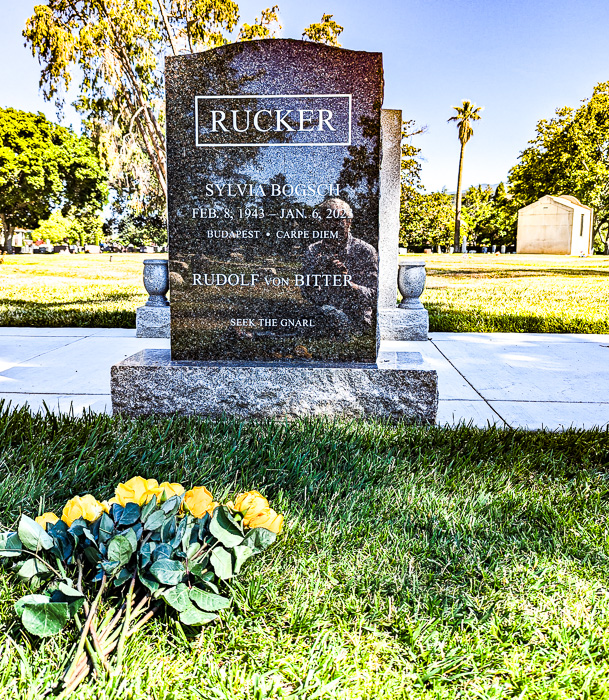
The least comforting viewpoint is that when you die, you die. Like a light being turned off. Like a decades-long movie hitting a jump-cut…with nothing on the other side. Maybe it’s like going under total anesthesia and never waking up.
Some of you will have had anesthesia. When you rise out of the black in the post-op room, it’s as if no time elapsed. Unlike after sleep, you don’t seem to have had any intervening dreams. Jump-cut. But, as I say, if you’re dying, it could well be that there’s nothing on the other side.
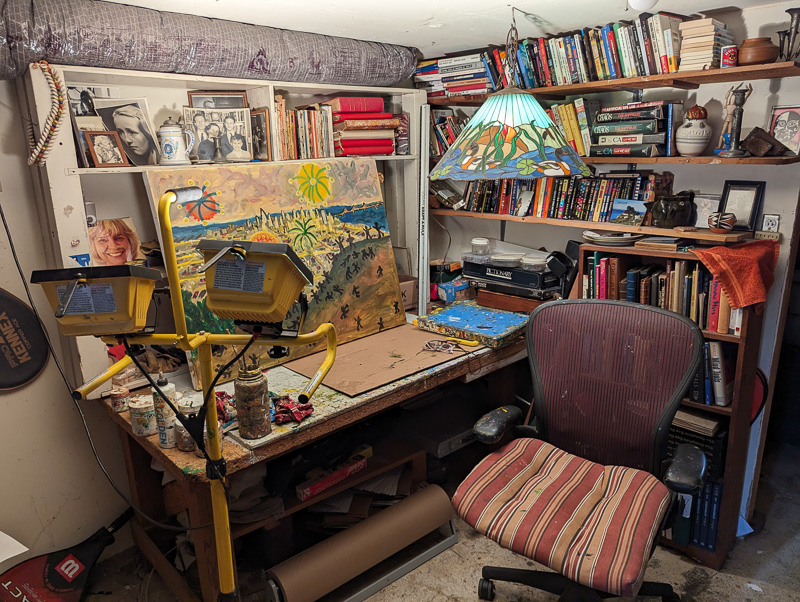
It’s certainly reasonable to entertain the lights-out view of death. In our time we tend to think of consciousness as an epiphenomenon. Something that flickers within a living body like flames within a campfire. A computation being carried out by the brain and the physical body. If the body’s gone, there’s no more computation. No more epiphenomenon. No more you. Dead is dead.
I don’t like thinking that. No point trying to be all tough and hardcore. You’re gonna die away. So why not believe something that makes you happy?

The most obvious solution is the traditional one: a dead person has a soul that lives on. Like an angel or a ghost. An insubstantial, yet living, form that spends a lot of time off in heaven, but who is sometimes here with us, unseen, but real.
And I can get into that. We don’t know what the world really is. Anything’s possible.
It seems like the soul spends more and more time up in heaven as the years roll on and our memories fade. For years when I’d look up at the night sky, I’d imagine my parents to be up there, kindly looking down, like smiling stars. But now I don’t do that as often with my parents. They’re further away and, one might say, closer to God.
As for Sylvia, she’s still close, not up in the sky all the time. For the first few months, she was in a corer by the ceiling in the living room, just over the spot where she died. Now she’s more like a person I know is standing next to me, just out of sight. Not always there, but sometimes. A benevolent presence. Reading over my shoulder right now.
Hi, Sylvia.
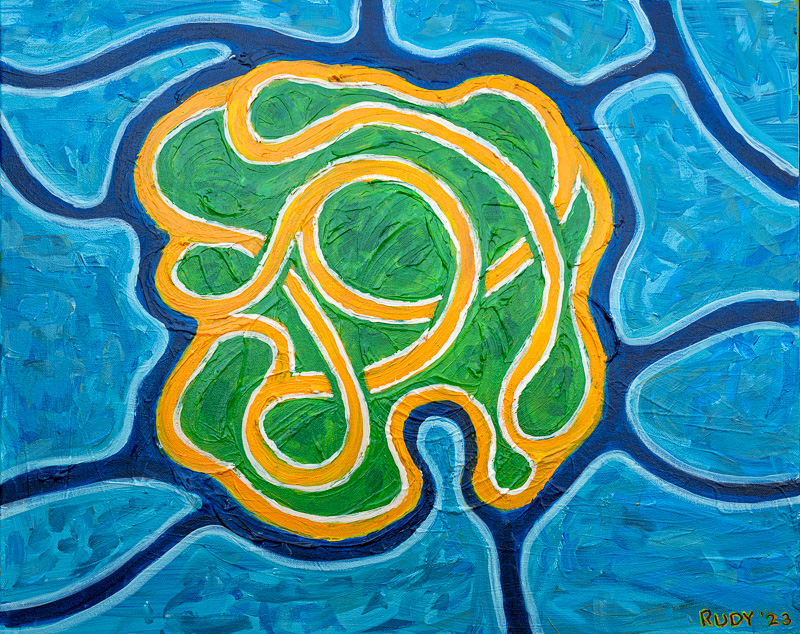
[You can find info about the paintings in this post on my Paintings page.]
I’m writing this part of the post on my laptop as I sit on a bench in the Los Gatos town park. It’s Sunday. Around me is the weekly Farmer’s Market. Hundreds of people, scores of booths, music, sun and shadow. Tonight the park will be empty. This week’s market event will be dead.
Or will it? Even if we don’t believe in ghosts, a very weak way past the dead-is-dead stance is to espouse a spacetime view of the world, then nothing is really gone. It’s just a little farther back along the time axis. The universe is a static block of spacetime, and time is not in fact passing. The passage of time is a persistent illusion that we humans have at each and every cross-section of spacetime. We’re always there, and we’re always wrong about thinking the past is gone.
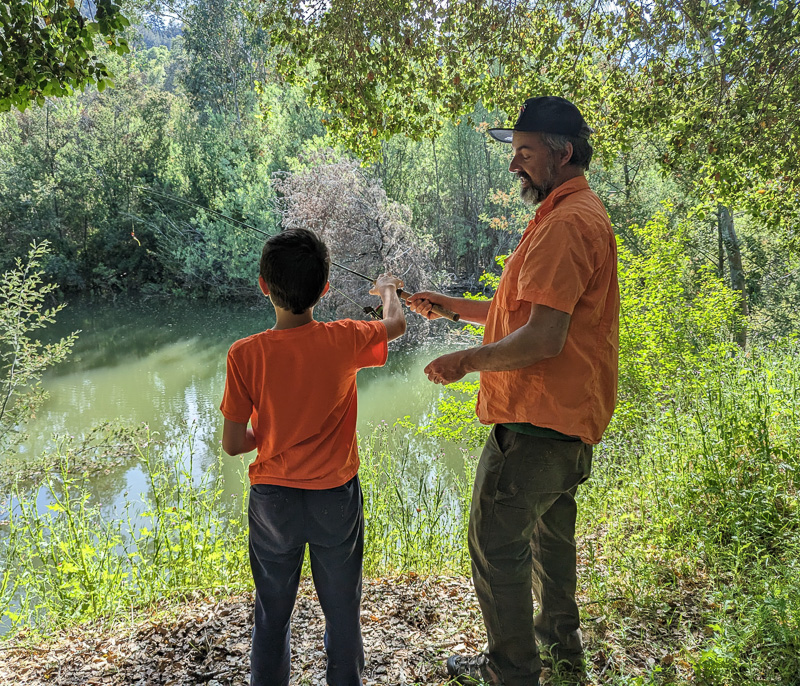
I once had the chance to ask Kurt Gödel, “What causes the illusion of the passage of time?” Along with friend Albert Einstein, Gödel was one of the deepest thinkers of the 20th century. His answer: “The illusion results from confusing the given with the real.”
So, sure, maybe, but that’s pretty abstract. If you’re grieving over a dead person or, for that matter, dreading your own death, the spacetime viewpoint is thin gruel indeed.
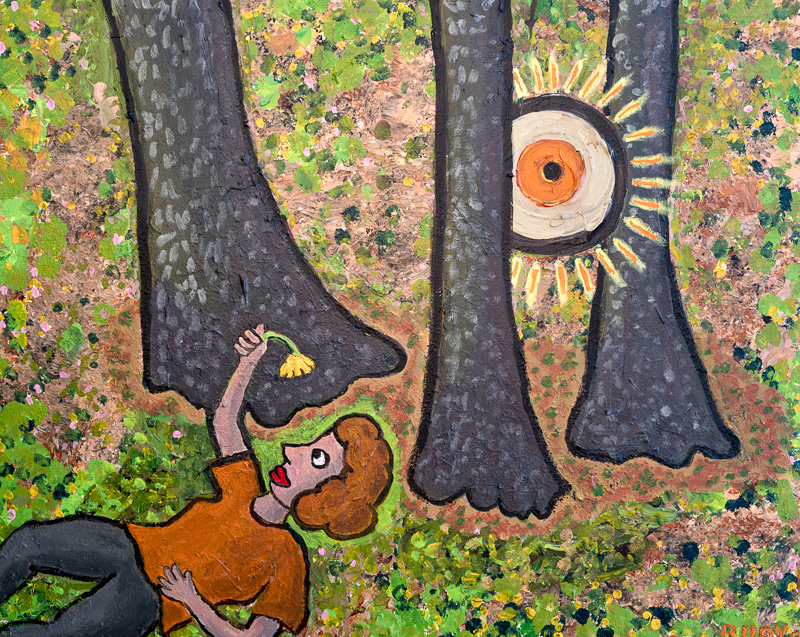
Cue corny anecdote. My preacher father liked to tell the story of a little boy who’s frightened by a night thunderstorm, and he runs to his parents’ room and gets into their bed. “Can’t you just pray to God?” says the father. “He’s always with you.”
“If there’s a storm,” said the boy, “I need someone with skin on.”
And, sigh, ghosts don’t have skin.
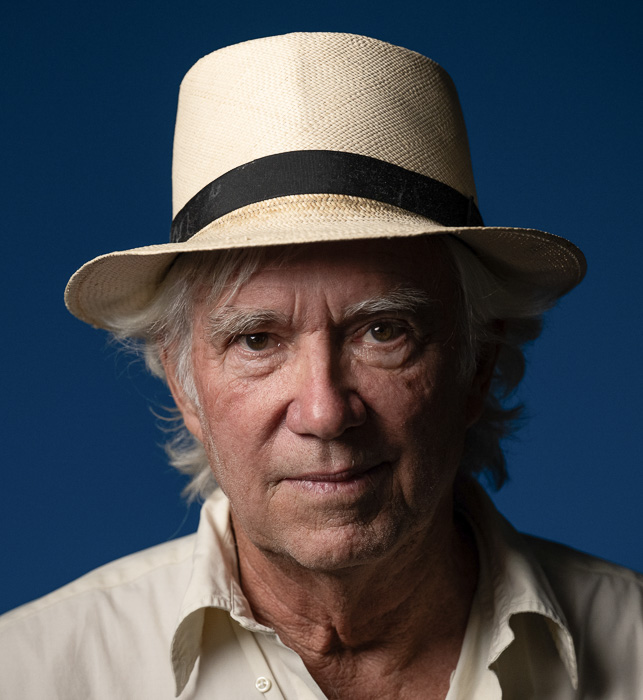
[Recent portrait by Bart Nagel
About two weeks ago I drove up to SF to have dinner with John Shirley, Paul Mavrides, Hal Robbin, and some of the other cyberpunk/SubGenius types. Cozy. John’s wife Mickey was very emotional about how much she loved Sylvia, and how she now misses her. I told her Sylvia is alive in my head, and for a about a minute we got into this thing where Mickey was talking directly to Sylvia through my glassy, wide-open eyes. We were doing a routine.
Mickey goes “Hi Sylvia.” And I raise my voice and say, “Hi Mickey,” and it feels real…but then it’s too creepy to keep going.
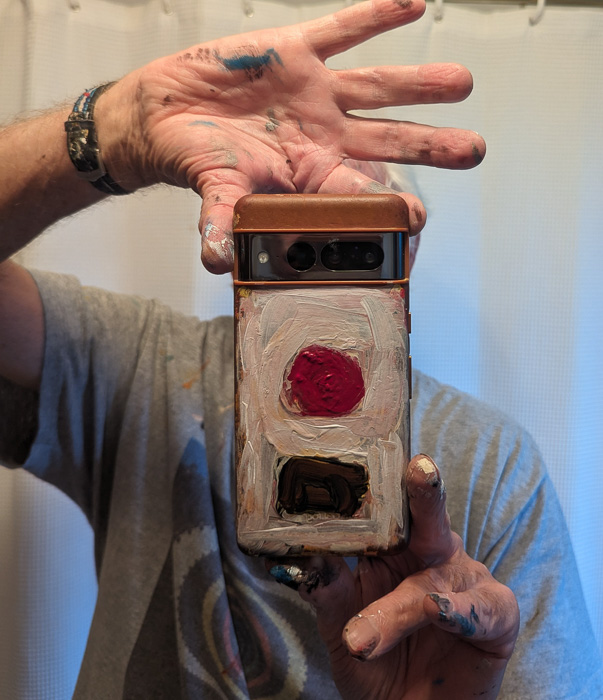
Coincidentally, the next day my grief and loneliness were at a peak—it comes and goes, maybe like a sneaker-wave that douses me on a beach. Sylvia, Sylvia, Sylvia. She’s gone for good. She’s always with me.
Certainly one way that Sylvia is still present is via the children and grandchildren. Each of them has certain traits or looks that come from Sylvia. Sometimes when I catch a glimpse of one of my daughters I’ll think, for a split second, that I’m seeing Sylvia.
![]()
In a related way, when I’m with the family and we’re talking and reminiscing and joking it’s as if Sylvia is still part of the conversation. Her figures of speech, her opinions, her laughter, her questions, her comments—all of these are echoed in our little group.
Here’s a recent painting of our family members. We’re all about one inch tall and we’re in a little boat in rapid, turbulent water, going past big frogs and lurking squid. Our current life in a nutshell?
(It’s just the OG family, no grandkids, but I threw in our departed dog Arf, and Isabel’s lost dog Rivers.)
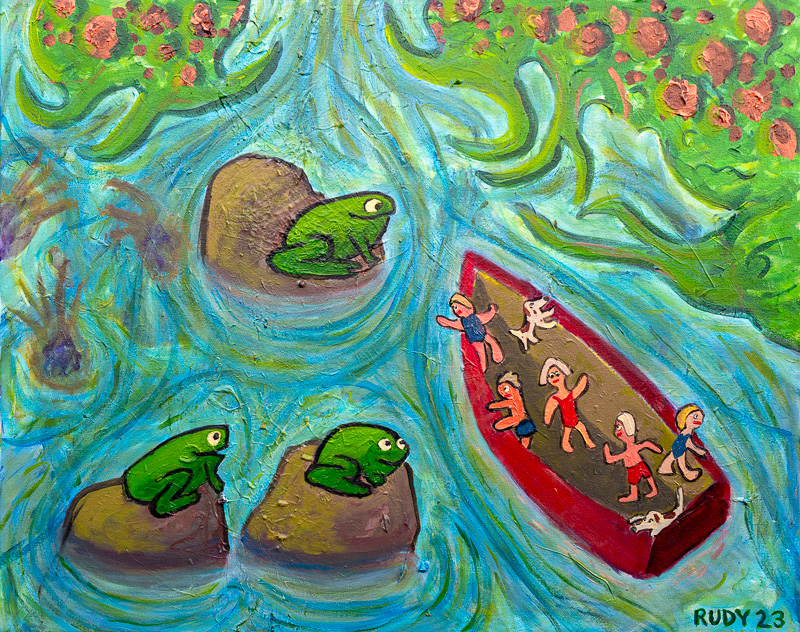
Last week when I was visiting SF, Rudy Jr and I went and got treats with his three kids at the nearly empty St. Francis Fountain shop on 24th St in the Mission. The shop isn’t a Disney-park reconstruction, but simply a 1940s soda shop that happens to remain. I felt a stabbing feeling that I might call “time pain”. Like “heimweh” in German, literally “home pain,” meaning homesickness. “Time pain” is my try at temporal equivalent of that. Paint at being separated from an earlier time. Oh, hell, you could just say nostalgia.
The simple pleasure of the grandkids, young with their whole lives ahead of them, and not even knowing that fact, or thinking about it.
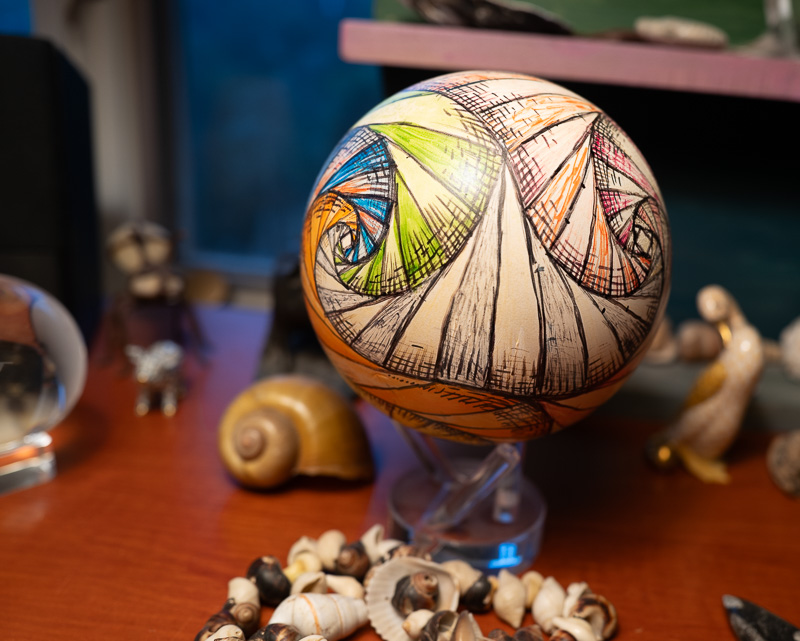
[This spherical sculpture is by my friend Dick Termes.]
I’d prefer not to be a grieving parent who continually discusses his loss with the kids and grandkids. Maybe I’ll get there. So far they don’t seem to mind or resent my bringing it up. It’s still present in their minds as well. I hope in a year or two it’ll damp down, at least somewhat.
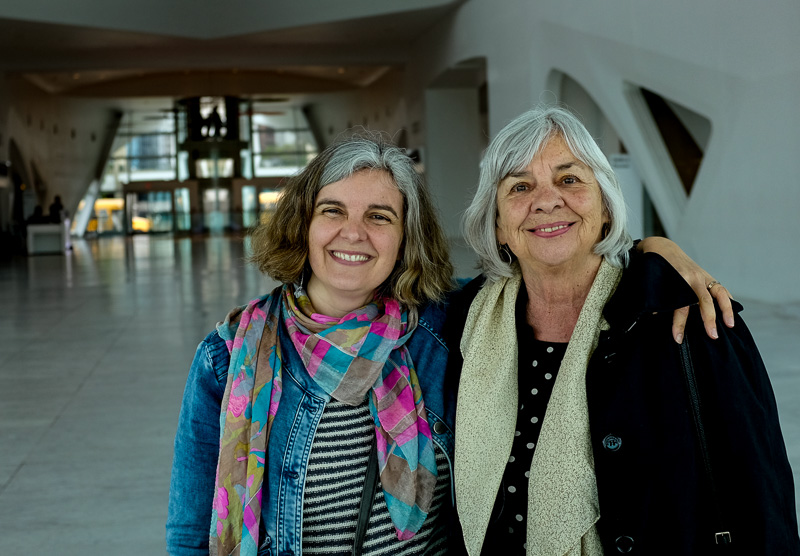
Now a different take on what the afterlife might be. I have a very good model of Sylvia in my head. A human brain is, at least for now, the best possible “computer” for simulating a human. And I have an immense data base on Sylvia.
As an SF writer and a computer maven, it occurs to me that my brain can run a simulation of Sylvia. What I call a “lifebox” in my nonfiction tome The Lifebox, the Seashell, and the Soul. Or you might listen to my UC Santa Cruz podcast on Lifebox Immortality And my most recent novel Juicy Ghosts is about a big company renting out lifebox slots in their cloud silo. Rent-A-Soul.
I even designed a “Rudy’s Lifebox” wepbage which you can use online to emulate me. Go try it. Go to the input box on the Rudy’s Lifebox page and enter: Sylvia’s lifebox. Check out some of the links that you get.
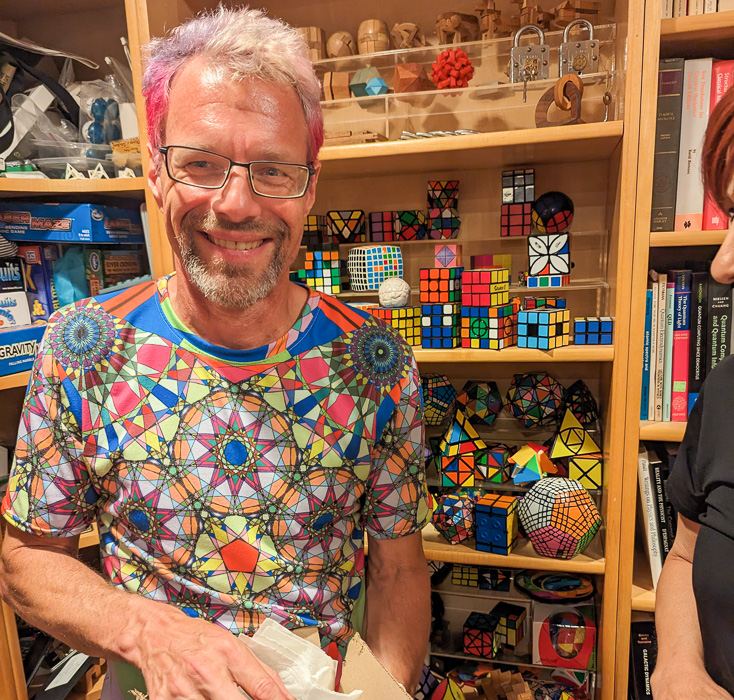
But let’s talk about an internally-generated “no tech” lifebox, as I was just starting to say.
I got nudge toward the “no tech lifebox” idea when I recently had Bob Hearn for lunch…he’s a computer programmer, also into mysticism and Buddhism, goes to Burning Man, and he gets ecstatic satori by running ultramarathons—when I saw him he was preparing for a trip to Greece to run 150 miles from Athens to Sparta in 30 hours. An only-in-silicon-valley guy.
I told Bob my notion that Sylvia exists as a lifebox simulation in my brain, and he said, why think of it as a simulation? Why not say it’s real? Reality is, after all, a completely fluid and arbitrary and in-the-eye-of-the-beholder thing. If all the Sylvia processes are in place, why not say it’s an actual Sylvia.
And as I said, for forty years I’ve been writing SF stories and novels where a dead person is still alive, in the form of some software running on a machine or in the cloud or on some wetware organism. And, again, my brain is considerably richer than any of the bits’n’chips computers foreseeable anytime soon. So of course my brain can run a farly accurate emulation of Sylvia.
And again, as for the data base, I know very much about Sylvia, having been married to her for 55 years. I have a rich data base of audio and video and photos and the words and voice-tones and facial expressions, yes, all the words. More than enough to base a lifebox simulation on. And not just all these dry facts, the waves of emotion, the dancing, the outings, the walks on the hills.
Yes, it’s safe to say that I do have a version of Sylvia living inside me.
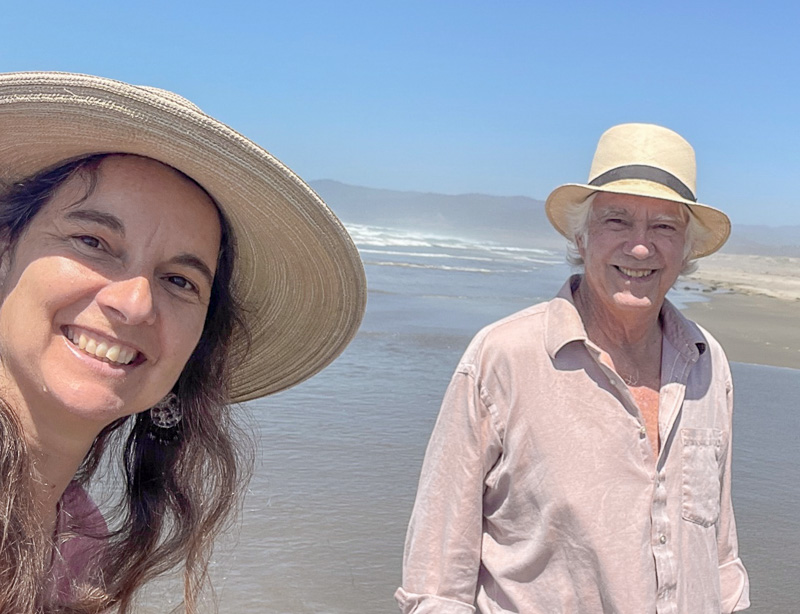
And now I’m fooling with this insight, opening up to it, and it makes me feel much better than I did a few days ago.
The Sylvia who lives within me isn’t just a model that I can contemplate. She’s a living being who I can talk to and, more importantly, this inner Sylvia can respond.
“Hi, Ru!”

A side benefit having a live Sylvia on hand it that, that, when the remorse-loop stage of grieving gets to me, I can apologize to the inner Sylvia for the things I did wrong.
And if Sylvia is in some sense alive, she’s likely to accept my apology, as she was kind and generous. Or maybe she doesn’t accept the apology and she wants to talk about it some more…and that’s okay too. That’s what we’d do. Either way, once I run through the process of “talking to Sylvia,” I’m all okay for a while.

Here’s a photo of Sylvia and me, in the form of two logs. In the last months, we’d lie together like that in the mornings, close as close can be, hugging, desperate, terrified.
And now I’m thinking of one of the very last mornings in our bed, before she started sleeping alone in a hospital bed in the living-room upstairs. We were hugging, as I say, and throwing our legs over each other in a casual way, mixing them together, the legs also like those logs.
And then Sylvia says, her voice breaking, “You’ve been so nice to me, Rudy, through all this, taking care of me, it’s been so hard, and you stuck with me, and it makes me want to say I forgive you for all the mean things you ever did…and maybe I shouldn’t even say this…but I do.”
And that’s a good thing for me to remember. We already made our peace before she died.

Going back to the general notion that a version of Sylvia is in some sense truly alive within my mind, I discussed this with my therapist at my bi-weeklly grief counselling session on Zoom.
And he says, yes, of course that’s true. We’re not just alive on this level. You might even say that we have a higher body—the subtle body, or astral body, or causal body—why not just call it the soul. And given that Sylvia was so tightly bound to me during her life, then of course her soul is with me.
One more touch. Besides the counseling, I was in a grief group for a few weeks, and I was talking to the others about my notion of being able to talk to a living Sylvia in my head, and a woman said, “Well, of course. My husband will always be alive in my heart.”
That’s warmer than saying Sylvia’s soul is a life-box-emulation process in my brain. Being an SF writer and CS professor, I tend to have this fixation on brains as opposed to the whole body. But, yes, saying heart is a fuller expression of what it’s all about.
So alright! Sylvia’s in my heart. Problem solved.
Light beamed from madman’s stark, staring eyes, as if he were a jack-o’-lantern with a flare within.
And that’s me. No, no, just kidding, this post isn’t meant to be creepy SF. I’m thinking about something much cozier than that. Like…me sitting outside on the side porch, late afternoon, nice sun, quietly chatting aloud with Sylvia. Getting her caught up on what’s happened around here. Or sitting by her grave for an hour and telling her the news. And the mountains in the background, and the open sky above, and her shiny gravestone. Talking feels good.
Here’s a lovely little poem by Sylvia. I found in a tiny spiral notebook in her car. It just kills me.

I’ll always love you, dear.









September 27th, 2023 at 3:21 pm
Surely there’s a dual space where we are spread throughout space and time. Always existing in some version of being.
September 27th, 2023 at 3:26 pm
Beautiful, pops. Endearing, encouraging, extra.
September 28th, 2023 at 12:00 am
There’s definitely something to the simulation idea. I’ve had on many times had dreams where lost loved ones have appeared. They act exactly as I remember them. One time I had a dream where they said something really funny, and it was exactly their sense of humour, and something I never would have come up with myself.
September 28th, 2023 at 8:34 am
That was beautiful.
September 28th, 2023 at 3:18 pm
imoebius.com
he year I was sleected to be the observer and the observed, the actor and the audience 1932 1984 2000 and 2001 now
pimoebius.com Hello Out There
1984
I was selected to be the listener, the observer , the observed, the actor , the audience, the data base, the searcher/ finder and a recorder in 1984, a super year
i hope you are having a mindquake like I had, its the only way to experience human reality, imo. I am 91+ and my husband and I lived as one person. That was not always a good thing when he was alive but the memories and more understanding has made it a miracle stretched out in time, so I could see
and feel it happen.. 1984 was a target, and everything was linked into a planetary unit.
“For centuries and thousands of years something has circled and circled in human thought that it has never successfully expressed.” P. D. Ouspensky
“Destiny is the result of two factors which grow together
in the life of a human being; one streams outward from the inner depths of the soul: the other comes to meet man from the world around him.” Rudolph Steiner
1 infinity plus 1/2 infinity = 0 and a half
September 29th, 2023 at 1:04 am
EVERNESS
One thing does not exist: Oblivion.
God saves the metal and he saves the dross.
And his prophetic memory guards from loss
The moons to come, and those of evenings gone.
Everything in the shadows in the glass
Which, in between the day’s two twilights, you
Have scattered by the thousands, or shall strew
Henceforward in the mirrors that you pass.
And everything is part of that diverse
Crystalline memory, the universe;
Whoever through its endless mazes wanders
Hears door on door click shut behind his stride,
And only from the sunset’s farther side
Shall view at last the Archetypes and the Splendors.
-Jorge Luis Borges
translated by Richard Wilbur
October 1st, 2023 at 4:22 am
Even given the circumstances under which they were written, each one serves as a reminder to me about how I should value my own family members and the time I have left with them.
October 2nd, 2023 at 2:40 pm
I so sympathize with your heartfelt loss.
After my own losses, I grew alarmed to learn that people can die from a broken heart: it can be dangerous to deeply grieve for a long, long time.
I am glad your thoughts are making you feel better.
People believe any and everything without evidence which can sometimes make them vulnerable to those who would take advantage of this capacity.
For the sake of the loves we’ve lost, we need more empathy toward each other, now.
October 5th, 2023 at 6:01 pm
Of course there’s life after death. Once you’re dead, you’re dead, but other people will be alive. That should be afterlife enough for anyone. It isn’t, but it should be.
Grief comes and goes. Usually it fades, though not entirely. That’s natural, it’s how we’re evolved to be.
October 9th, 2023 at 3:27 pm
I’m certain everyone has a “life box” of their loved ones. And they have for millennia.
Pliny the Younger once wrote of a recently dead friend:
“He lives, and will live on forever; and his fame will extend and be more celebrated by posterity, now that he is gone from our sight. I keep thinking of Verginius: I see him before me: I am forever fondly yet vividly imagining that I hear him, am speaking to him, embrace him.”
William Penn said something similar (J.K. Rowlings used this quote in a Harry Potter book):
“Death is but Crossing the World, as Friends do the Seas; They live in one another still. For they must needs be present, that love and live in that which is Omnipresent. In this Divine Glass, they see Face to Face; and their Converse is Free, as well as Pure. This is the Comfort of Friends, that though they may be said to Die, yet their Friendship and Society are, in the best Sense, ever present, because Immortal. “